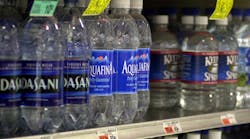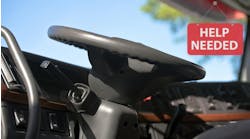It's the hottest time of the year in North America and not drinking enough water is like driving drunk, according to a recent study published in a medical journal.
Truck drivers are especially prone to dehydration. Many truckers don't drink enough water because they don't want to stop for frequent bathroom breaks. And while there's no evidence that caffeinated drinks cause dehydration, they can be a mild diuretic in large amounts. Also, while the A/C may feel good, that cool breeze sucks moisture from the air and your body.
Even being mildly dehydrated is the same as driving drunk in terms of making errors in judgment and performance, according to researchers at Loughborough University in Loughborough Leicestershire, U.K.
“To put our results into perspective, the levels of driver errors we found are of a similar magnitude to those found in people with a blood alcohol content of .08%, the current U.K. legal driving limit [U.S. commercial drivers have a legal BAC limit of .04%] In other words drivers who are not properly hydrated make the same number of errors as people who are over the drunk drive limit,” said Professor Ron Maughan, Emeritus Professor of Sport and Exercise Nutrition at Loughborough University and Chair of the European Hydration Institute (EHI) Science Advisory Board. EHI describes itself as "a foundation established with the objectives of advancing and sharing knowledge of all matters relating to human hydration and its effects on health, wellness and performance."
Maughan led the study that tested male drivers in a simulator and found that during normal hydration they made 47 driving errors but that figure more than doubled to 101 driving mistakes when they were mildly dehydrated. The driving errors included lane drifting, late braking and touching or crossing the rumble strip or center line.
He adds: “There is no question that driving while under the influence of [alcohol] or drugs increases the risk of accidents, but our findings highlight an unrecognized danger and suggest that drivers should be encouraged to make sure they are properly hydrated."
Jane Holdsworth, Director of the EHI, said: “Anecdotal evidence suggests that many drivers avoid drinking on long journeys to minimize bathroom stops, yet we know that even mild hydration can cause symptoms such as headache, tiredness and lethargy."
How can a driver tell if he or she isn't drinking enough water?
According to the Mayo Clinic, signs of mild dehydration include:
-
Dry, sticky mouth
-
Sleepiness or tiredness
-
Decreased urine output
-
Dry skin
- Dizziness or lightheadedness
The best indicator of hydration is the color of your urine, the Mayo Clinic notes. Clear or light-colored urine means you're well hydrated, whereas a dark yellow or amber color usually signals dehydration.
You are at added risk for dehydration if you have uncontrolled or untreated diabetes, a cold, fever, (because you don’t feel like eating or drinking when ill) taking certain hypertension medicines (especially those with diuretics) or driving in high altitudes.
The study was published in the journal Physiology & Behavior.




